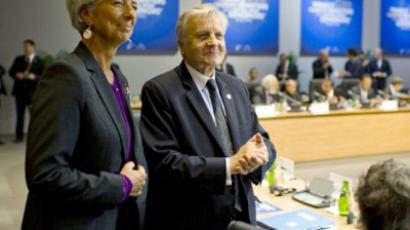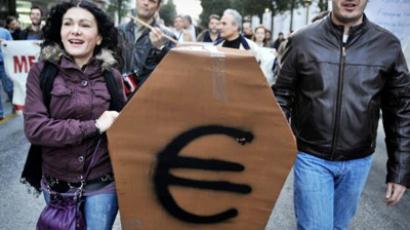British MP on EU: ‘It turns out we shackled ourselves to a corpse’
Fundamentally, Europe is in the mess that it is in today because it is trying to do too much by conscious deliberate design, believes British Conservative MP and arch Euroskeptic, Douglas Carswell.
“We need to allow different parts of the European continent to do what suits them best,” the MP argues, pointing out that Europe achieved its economical prosperity precisely because it did not have political centralization. “Europe was allowed to prosper,” he affirms. “We need a decentralized Europe and, I’m afraid [that means] rejecting the whole EU project completely,” continues the MP, calling for a referendum “to lead the UK out of the EU.” “The EU is a 1950s political structure; it is an outdated architecture for a modern continent,” believes the Euroskeptic, adding that it is preventing Britain from being a really global player by isolating it from the world.When the UK joined the forerunner of the European Union in the early 1970s, Western Europe back then accounted for 36 per cent of global GDP. Today, the whole European continent accounts for far less, and by 2020 it will account for a mere 15 per cent of global GDP.“We joined what we thought was a prosperous trade bloc – it turns out we shackled ourselves to a corpse. We’d be better off out,” concludes Carswell. However, the MP does not question the need for free trade and freedom of movement between the EU and the UK, which he says should continue. “The UK should rather become a good neighbor of the EU instead of being grudging tenants in the EU apartment,” explains the MP.Significantly, the British parliament voted earlier this week against holding a referendum on EU membership – in defiance of the will of a large part of the population. Only 111 MPs voted in favor of the referendum with 483 against. Ahead of the vote, the British PM and Conservative Party leader David Cameron called on MPs not to back the referendum move, comparing the EU with a good neighbor in need of help. Nevertheless, as many as 79 Tories voted in favor of the referendum, exposing a split in the ruling party.In any event, the fact that Britain must now allocate billions to support a currency it has taken a decision not to join looks very strange to Douglas Carswell. The PIIGS countries (Portugal, Ireland, Italy, Greece and Spain) should consider returning to their national currencies, which would help them to overcome the crisis, the MP says, and even the EU’s heartland – Germany – “should be allowed to establish its own currency,” believes the Conservative politician. “Whichever way you look at it – it involves breaking up the euro,” he insists.Speaking out on bailing out the banks that actually created the problems in the first place, Douglas Carswell predicts that, at home at least, “we are going to prop up these banks.”“These banks have been so badly wrong, such victims of their own greed that unless we do so, our economy will disintegrate,” he says, adding, “let’s at least prop up the banks in Britain, let’s not channel all that money to Athens, Lisbon or other third party countries.”The British MP believes that the bailouts conducted by the EU have actually added to the national debts of those countries Brussels is attempting to save. “Greece and Portugal have more debt today than they had when the bailouts began. These bailouts are not helping. These bailouts are the first in history that are actually scooping water INTO the boat. Eventually, they are going to sink it,” the MP affirms. The political system of modern Britain is broken, insists Carswell, and the country now needs more direct democracy so that people can have some control over public policy.“Britain is [experiencing] a series of crises of the elites,” confesses Carswell, and these crises are sparked by unaccountable concentrations of power in banking, the media and politics. But the age of digital democracy is changing this because, as the British MP says, “everything that the internet touches, it opens up to greater accountability” – a development which he believes will usher in direct democracy.














